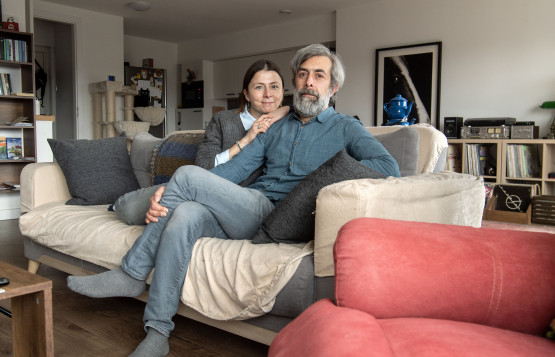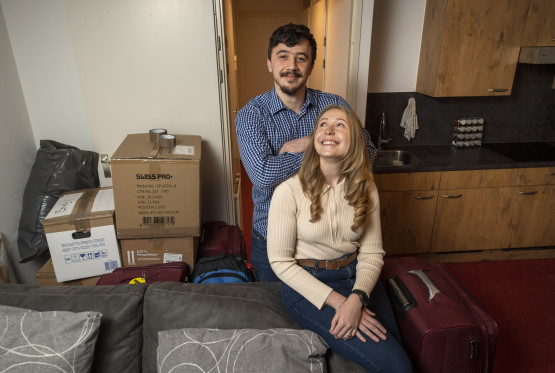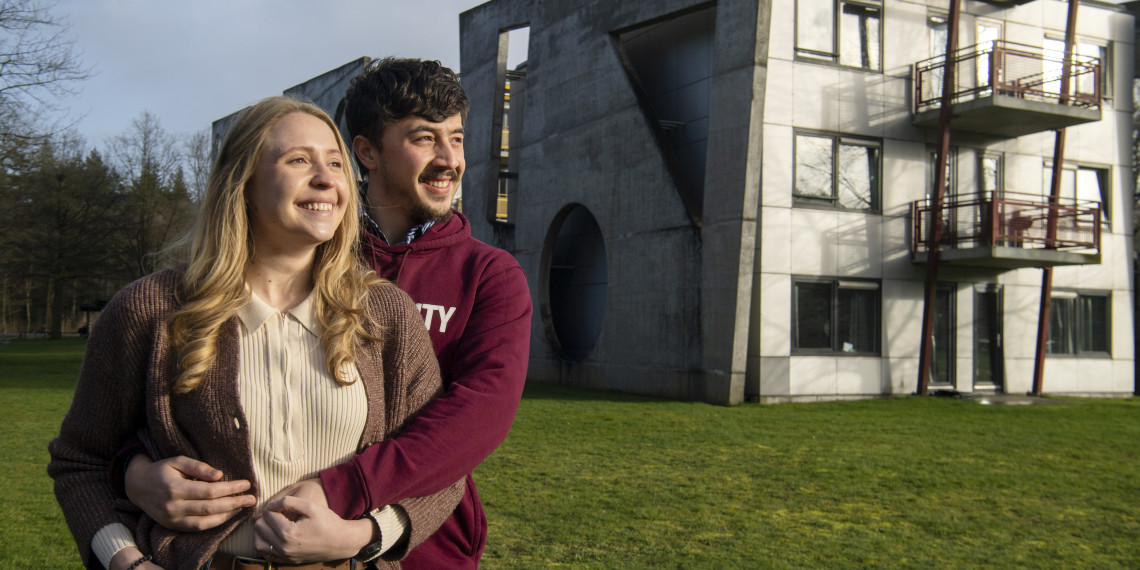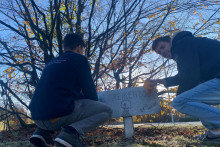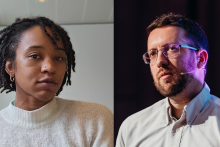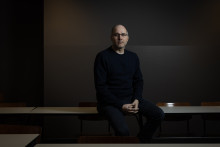‘It seems that we, as UT employees, are living in a UT bubble, but our partners face much harsher struggles,’ says Canan Acar (Assistant Professor at the Faculty of Engineering Technology), Turkish national who arrived to Twente two years ago together with her husband. He hasn’t been able to find a job since. ‘I was surprised to hear that people weren’t really aware of this issue and how much it impacts us. I think this conversation is important in order to find support. Because in the end, the struggles of our partners also affect our performance at work.’
‘This is a stressor that is not talked about at the UT’
‘This is a stressor that is not talked about at the UT,’ says PhD candidate Austin Labuschagne (Faculty of Engineering Technology). ‘My wife and I are originally from South Africa and we arrived to Twente a year ago, in April 2022. The UT was amazing, it helped us a lot, they provided temporary housing on campus and so on. But there is one problem that the UT can’t solve, and that is also experienced by many of my colleagues: difficulties of the researcher’s spouse. The two partners live in completely different worlds. While one lives in an amazing UT bubble, where everything is provided, where you can do sport for free, speak English all the time and meet nice international people; the other one has to deal with the harsh reality of living in a foreign land with different customs, new language and no friends or colleagues.’
No job opportunities
This leads to a big disparity in the household, adds Labuschagne. ‘There is a huge separation between what one partner experiences and what the other one is going through. The partner who has a job at the UT is likely to pressure the other to find a job, even if it’s not a job that suits them. That can be very demeaning and demotivating. You can even be fluent in English but that doesn’t necessarily matter in Enschede. I think it is very hard for highly educated foreigners to find a job in Twente.’
His wife Ciska Labuschagne has experienced this firsthand. ‘We are actually lucky because we speak Afrikaans which is quite similar to Dutch,’ she says. ‘I was able to find a job in Enschede, but it is not in my field and I’m not so happy about that. I have been looking for other jobs but there aren’t any. Most evenings, I’m emotionally and mentally exhausted . Then I come home to a spouse who tells me about the amazing day they had, working on nice projects and learning about different cultures from their colleagues. It’s draining and discouraging. Your partner, who is doing a PhD, then has to deal with your exhaustion. Because I’m so drained, he has to take care of many things – such as arranging a mortgage for our house. He has to do a lot of that during work hours, which means he has to work in the evenings and weekends. I can see that it takes a toll on him. And it seems to be the same for everyone in our circle.’
UT scientist Canan Acar and her husband Onur Kahraman have a very similar story to tell. ‘There is indeed a big difference between us,’ says Kahraman. ‘Canan has a regular life, she has a good job, nice colleagues, access to facilities. That is not the case for me. I haven’t been able to find work since we arrived here. This has put a strain on us. It’s not just about the money. I want to work in this region and I want to contribute to this society. This is not our first time living abroad. We lived in the US for many years, and so we know what it’s like to move to a foreign country, to integrate in the local society. And that is what we want – to integrate. We don’t want to be on the side. I’m actively trying to do that. I go to expat meetings, I’m learning Dutch, I go to the library, I volunteer. I’m not unhappy but it’s not a sustainable situation.’

UT scientist Canan Acar and her husband Onur Kahraman.
Disadvantage for the UT
‘All this puts a lot of pressure on me,’ responds Acar. ‘I have raised this issue with colleagues because I have had a lot of anxiety. We came here because of my job. We are not EU citizens, and so we need this job to stay here. If something happens and I need to leave my job, what will happen to us? There is no other option for me. I don’t have the luxury to explore other options in my career, I can’t take risks. I have to make it because he came here for me. He is active, he doesn’t sit at home the whole day or anything, but it is still on my mind. There is a flow to life and he is not part of it.’
As both couples say repeatedly, the troubles at home leak into work, their performance and possibly also their commitment to the region. ‘The fact that your partner is unhappy causes a lot of problems in the background that people aren’t aware of. If my wife is unhappy, it is very demotivating. Then I’m distracted at home and at work. It leaks into each other,’ says Labuschagne. ‘To be clear, I want to stress that we are really happy to be here. We are thankful to live here, but there is a part of us thinking that it’d be easier if I stopped my PhD and we could move to the west of the country, for example. There it would be easier for my wife to find a job.’
‘You need to think about why people should choose Twente’
‘I think this puts the UT at a disadvantage,’ says Acar. ‘There are four technical universities in the Netherlands, so you need to think about why people should choose Twente. It has crossed my mind that it’d be much easier if we moved to Randstad where my husband would have a much higher chance of finding a job. We don’t have children and so we are not so dependent on a double income, but many people are. I wouldn’t have come here if we really needed this double income. But it’s really more than money. I constantly ask myself: what connects him to this environment? What is his life here?’
What the university could do
Because this issue can so heavily impact UT employees, the researchers and their partners believe it would be helpful if the university offered structural support to international couples. ‘It’s of course not the UT’s responsibility to make the spouse happy, but in the end it does impact the UT, so it might be a good idea to try and fix it,’ says Labuschagne. ‘There are a few simple things the university could do to help. For instance, they could offer a Dutch class specifically for spouses. That could help a lot, because it helps you learn the language but also to get in touch with other people in your situation. It might also be a nice idea to have some sort of newsletter for foreigners. Dutch people take a lot of things for granted, because they grew up with them and know how to find them – like Sinterklaas or the carnival. For us it’s completely new and we don’t know where to find the information.’

UT PhD candidate Austin Labuschagne and his wife Ciska Labuschagne in their current home. Bags are packed before moving to their new house.
‘I have thought a lot about what the UT could do to help with this problem,’ says Canan Acar. ‘I really hope policy makers will read this and think about it because not much is done in terms of partner support right now. For example, there could be more volunteer options primarily offered to partners of UT employees. The UT also needs workforce, so they could help out with events and so on. If he worked somewhere as a volunteer, I know his Dutch would be much better and that would make it easier to find a job. There could also be more collaboration with the local expat center.’
The UT offers dual career support for new employees. Acar and her husband have used it and see room for improvement. ‘We have reached out to HR and M&C for assistance,’ says Onur Kahraman. ‘They have been nice and helpful. They put me in touch with a company that is affiliated with UT partners in the region and tried to help me find a job, but it didn’t work. I think the issue is that this company is not solely focused on helping partners of UT employees, it’s just a general job and recruitment agency.’
‘As a university, you can’t attract talent without thinking of what they bring with them’
‘As a university, you can’t attract talent without thinking of what they bring with them – meaning partners and children. Just as you need schools for the children, you need jobs for the partners. It is all connected,’ says Acar. Realizing this connection is the only way for the UT to attract and keep talent, believes the UT researcher. ‘The point of this story is not to complain. We are two adults who decided to come here together, but I want the UT to know because I want the UT to keep attracting talent – and to keep it here. There is already tough competition in academia, and so you have to make yourself attractive as a university. It is the people that make the university attractive. The people need to be happy here and stay here.’
